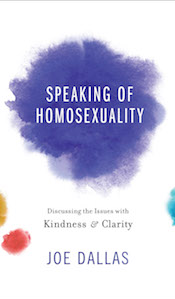Speaking of Homosexuality
How to talk about this controversial issue in a Christ-like manner
The Christian sexual ethic is out of step with the times. This is true across a wide range of heterosexual behaviors, such as premarital sex, cohabitation and no-fault divorce. But Christians are rarely called out for their opposition to those behaviors. When it comes to homosexuality, however, the response is different. Christian opposition to homosexuality generally or same-sex marriage specifically provokes accusations of homophobia and hatred.
The Supreme Court’s 2015 Obergefell v. Hodges decision, which legalized same-sex marriage throughout the nation, further contributes to the marginalization of the Christian sexual ethic. Same-sex marriage is now understood as a fundamental civil right, and opposition to it is likened to support for segregation in the American South during the era of Jim Crow.
How should Christians speak of homosexuality in this adverse environment?
That’s the question my friend Joe Dallas seeks to answer in his new book, Speaking of Homosexuality. Until 1984, Dallas was “a staff member with a pro-gay church, an openly gay man, and an activist, identifying as a gay Christian, arguing for the acceptance of homosexuality.” Then, however, his study of Scripture convinced Dallas that he was in error. For the last 30 years, he has ministered to others, both gay and straight, helping them to develop a biblical perspective on human sexuality. Dallas thus brings a unique personal perspective to bear on this controversial topic.
Dallas frames much of the book as a conversation between “Traditionalists” and “Revisionists.” Traditionalists advocate the “traditional view of marriage and sexuality,” namely, that marriage is the lifelong union of a man and a woman, and that outside of marriage, a person should remain celibate. Revisionists advocate “revising our view of Scripture or of morality in general to condone homosexuality.”
The first three chapters of Speaking of Homosexuality provide a “contextual overview” of the debate between Traditionalists and Revisionists. Chapter 1 argues that “knowing the context of our conversation can help us anticipate problems, adjust our approach, and stay sensitive to the perceptions and feelings of others.” Dallas points out that the often acrimonious conversations between the two groups typically revolve around “presumption, politics, and the personal” (emphasis in original). Both sides, that is to say, make assumptions about the other the side that renders them “guilty of stereotyping.” Consequently, “mistrust is a frequent companion” to such conversations.
Chapter 2 identifies three goals traditionalist Christians may have when speaking of homosexuality with others: “evangelizing an unbeliever, discipling a believer in error, or simply reasoning with someone about our different views.” These goals shape the content of those conversations in different ways.
Additionally, who your conversation partner is shapes the kind of conversation you have. Dallas identifies five groups in particular: “militants, mainstream, millennials, Revisionists, and friends and family.” Too often, traditionalists lump all LGBT people and their allies into the militant category. Dallas thinks this is a mistake. Rather, “most … could be described as mainstream, fellow humans and citizens with whom we have more in common than differences. And, per Jesus, they’re our neighbors, whom we’re to love and serve.” That last sentence is key, as far as I’m concerned.
Christian opposition to homosexuality generally or same-sex marriage specifically provokes accusations of homophobia and hatred.
Too often, Traditionalists approach those on the other side of this issue as enemies to be defeated rather than as neighbors to be loved. That’s not Jesus’ way of doing things.
Chapter 3 then outlines seven guidelines to follow when speaking of homosexuality:
- Speak clearly.
- Speak appropriately.
- Speak empathically.
- Concede what’s true.
- Consider what’s possible.
- Watch the apologies.
- Recognize and point out diversions.
I want to hone in on numbers 3 and 4, because this is where I think my fellow Traditionalists most often go wrong. We do not empathize with the “feelings” and “experiences” of LGBT people. Consequently, we are prone to speak “irresponsible, inaccurate, contemptuous words” at or about them. “Lots of Christians have said hateful things about gays,” Dallas writes. “Lots of Christians are more upset about homosexuality than they are about adultery or fornication, even though those are condemned in the Bible.” Both statements are true. There is no virtue in denying either of them.
If chapters 1-3 address the “context” of our conversations, chapters 4-13 address their “content.” Dallas examines the “origins of homosexuality” (chapter 4), whether “change” of orientation is possible (chapter 5), whether opposition to same-sex marriage is reasonable (chapter 6), whether moral disapproval of homosexuality in and of itself constitutes “homophobia” or “hate” (chapter 7), and in what sense a person can or cannot identify as a “gay Christian” (chapter 8). Dallas’ discussion of the issues in these chapters is nuanced, which is appropriate for the complex subjects they address.
Chapters 9-13 then take up the proper interpretation of the most commonly cited biblical passages disapproving of homosexuality: Genesis 19:1-11 (chapter 9); Leviticus 18:22, 20:13 (chapter 10); Romans 1:24-27 (chapter 12); 1 Corinthians 6:9-10, 1 Timothy 1:9-10 (chapter 13). Chapter 11 examines what significance Jesus’ “silence” about homosexuality has for the moral debate. Dallas’ treatment of these passages is brief but competent. Like him, I find it difficult to agree with Revisionist interpretation of these passages, for the reasons that he cites.
Indeed, in my opinion, it would be more intellectually honest for Revisionists to say that these passages are wrong or irrelevant than to say that they have been misinterpreted or misapplied. In other words, there is good reason why the Traditionalist position has been the default position of the Church for the last two millennia. It is because, as the children’s gospel song says, “the Bible tells me so.” If you’re familiar with the historical arc of the Revisionist position, it begins with “The Bible has been misinterpreted” and ends with “The Bible is wrong on this matter.” That is the arc of mainline Protestant thinking on this topic. My guess is that that is where evangelical Revisionists will land eventually as well. Disagreeing with the Bible is not a place where evangelicals should want to be.
Speaking of Homosexuality is a countercultural book. As I wrote at the outset, the Christian sexual ethic is out of step with the times. This is nothing new, however, since Christianity’s sexual ethic was out of step with the culture of its own time as well. The question, then as now, is with whom — or rather, Whom — we will walk in step going forward.
I’ll conclude this review with Joe Dallas’ closing words:
“A steward is rewarded for faithfulness, not outcomes. We hope greater faithfulness means greater outcomes. But ‘other things’ — such as God’s and the hearer’s will — come into play. And since those factors are out of our hands, we keep those hands on the plow, striving to improve our understanding, articulation, attitudes, and faithfulness to the standards we preach. Above all, we continue seeking deeper intimacy with the Master we serve.
“Speaking of homosexuality is a small part of that life commission. Our more general commission is to speak of Jesus, His teachings, His invitation, His nature, and His soon coming. Any truth we can lovingly communicate to better prepare people for eternity, binding them to Him, is critical.”
Joe Dallas, Speaking of Homosexuality: Discussing the Issues with Kindness and Clarity (Grand Rapids, MI: Baker Books, 2016).

Influence Magazine & The Healthy Church Network
© 2026 Assemblies of God

